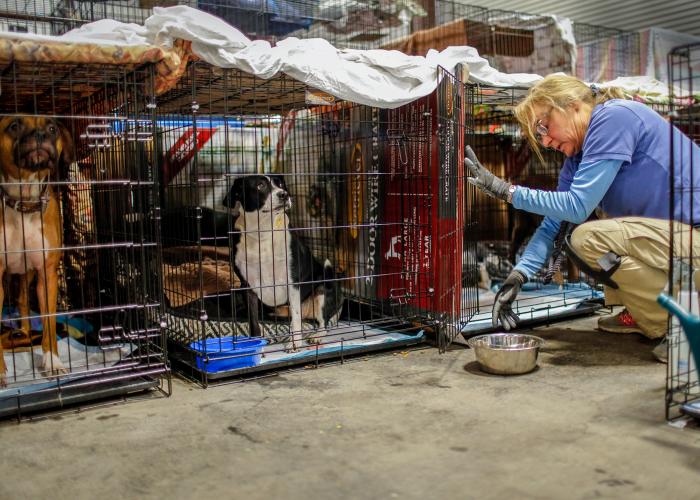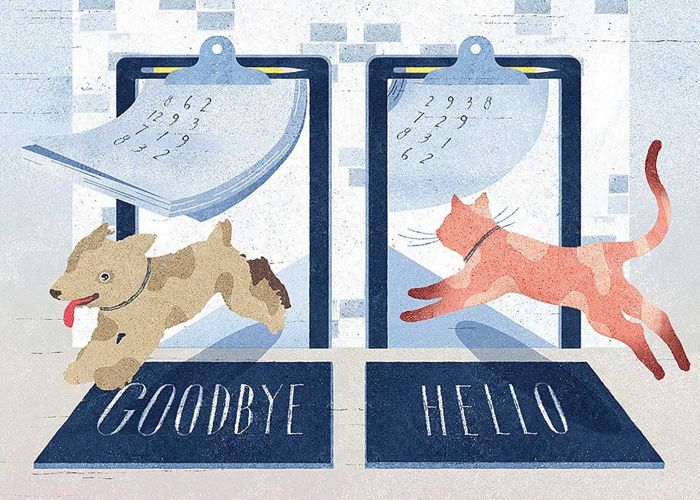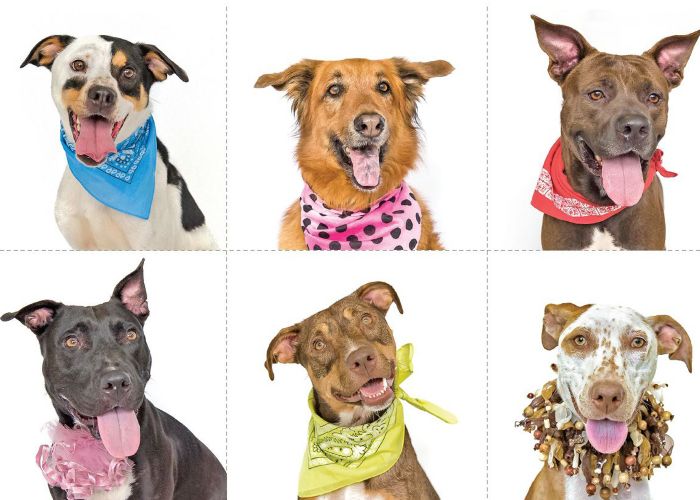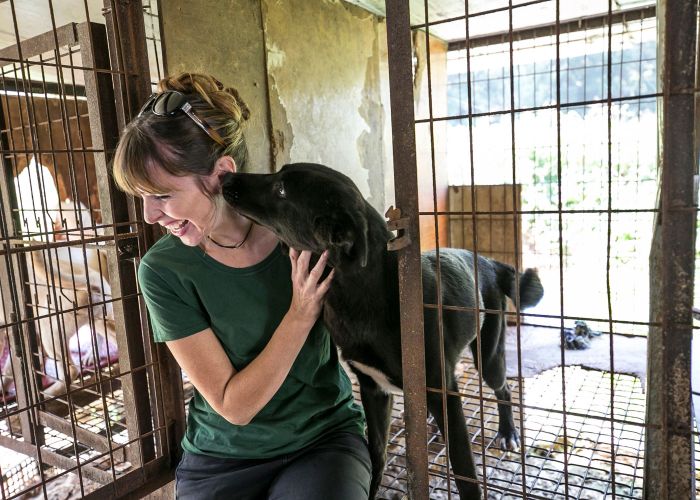Career spotlight: Veterinary social workers
Specially trained mental health professionals support veterinary staff, animal welfare workers, pet owners and communities

Not too long ago, the University of Tennessee College of Veterinary Medicine received a call from a local veterinary clinic. During what should have been a routine canine euthanasia, a dog got loose and bit the veterinarian performing the procedure.
The clinic staff didn’t want medical advice or animal handling protocols from the experts at UT. They were in search of emotional counseling.
“We just set up a Zoom session with them and said, ‘What questions do you guys have? How are you doing?’ ” explains Andrew Lufkin, a veterinary social worker for the college. “Something like this could be so devastating and just kind of blow the clinic up.”
Instead—because the clinic reached out, because UT has Lufkin on staff—they talked through the traumatic event. No blame or recriminations, just a chance to process what happened together.
Any trained social worker or counselor probably could have facilitated the discussion. But Lufkin’s background meant he had the unique knowledge and skills to understand the nuances of the situation: Lufkin is a graduate of UT’s Veterinary Social Work Certificate Program, which trains social workers on the intersection of mental health and animal welfare.

A not-so-new field
If you haven’t heard of veterinary social work, you’re not alone. Under that name, the field has only existed for 20 years—not enough time to permeate the broader culture. But the concept has been around for much longer and addresses some familiar themes.
“It’s pet loss. It’s animal-assisted interventions. It’s compassion fatigue and conflict management, and it’s also violence—violence between humans and animals,” explains Dr. Bethanie Poe, certificates coordinator for UT’s Veterinary Social Work Certificate Program. It’s “where we tend to the needs that come up in human and animal relationships.”
UT launched its program in 2002, when Dr. Elizabeth Strand was working on her doctorate in social work. Strand “realized there was this gap in services when it came to the needs of people and animals,” explains Poe. Strand brought together the UT College of Veterinary Medicine and the College of Social Work to develop the UT Veterinary Social Work program. In 2013, UT VSW launched their certificate program, the first of its kind in the United States. Students earning their master’s of social work can concurrently earn a VSW certificate, which requires studying topics such as the human needs in animal welfare, mediation and human-animal interactions and includes a field placement where students flex their skills in the real world.
Supporting clinicians has always been a key goal of the program. It’s sorely needed, says Dr. Joanna Robson, a veterinarian who practices in California.
“Coming out of school, we’re expected to be everything. Financial advisers, emotional supporters, diagnosticians … and we can’t possibly wear all of those hats and wear them well,” Robson says.
In a clinical setting, veterinary social workers can take the pressure off practitioners by wearing some of those hats: They can offer group or individual counseling sessions for clinic staff or a debrief on difficult cases. They can intervene when a client is struggling with finances or a tough decision. “And it takes that weight, that load, off of the veterinarian, who’s trying to be the professional that they were trained to be,” says Robson.
“Coming out of school, we’re expected to be everything. Financial advisers, emotional supporters, diagnosticians … and we can’t possibly wear all of those hats and wear them well.”
—Dr. Joanna Robson, veterinarian
“Animal folks have the biggest hearts,” adds Poe. “They want to help in every way they can. But there’s so much happening! So having an extra pair of hands and an extra skill set in this environment is useful.”
And while this kind of support has always been helpful, Robson says it’s even more critical as veterinary staff grapple with the fallout from COVID-19. “Places are understaffed, they’re overworked, mental health is in a severely dark place,” she says. Now more than ever, clinicians can use that extra set of hands.
Beyond the clinic
As the staff social worker for the college of veterinary medicine, Lufkin does more than offer community support. He also helps faculty, staff and students, offering both individual counseling sessions and support groups for technicians, critical care vets, interns, residents and more.
But veterinary social work has potential applications far beyond the clinic, says Lufkin, such as animal shelters, zoos and farms—anywhere that humans and animals interact. Even workers in slaughterhouses could benefit; Lufkin cites pandemic-related “culls” of animals raised for food as a situation that could be traumatizing to staff.
“There [are] so many paths—it’s a blaze-your-own trail thing,” says Robson.
The skills learned in a VSW program can also help connect humans with the healing power of animals—known as animal assisted intervention—in less-expected locations, such as libraries, animal shelters, hospitals and schools.
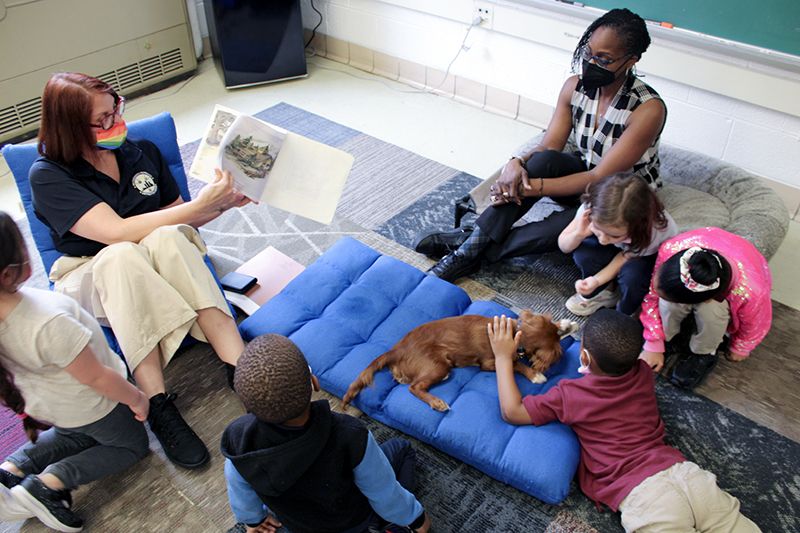
Shakesha Alexander’s career path took her into public education. A 2020 graduate of UT’s VSW certificate program, Alexander is now the director of animal-assisted interventions in Michigan’s River Rouge school district.
Since taking up her post last year, Alexander has launched multiple programs and has more in the works: There’s the Paw-ffice support staff program, where office employees bring small pets and service-trained facility dogs to work. There’s the Reading Assistance Dog program, where kids practice their reading skills with dogs, because “the dog won’t judge them if they make a mistake,” says Alexander. (Alexander’s own rescue sometimes takes part.)
She’s hosted a Puppy Homecoming and a Guinness Book of World Records event, where a celebrity dog broke the record for slam dunks in one minute. (He sunk 14.) And when the dogs need a break after sessions, they can decompress in the K9 Relaxation Station, a quiet space for napping and relaxing.
“The animals are a vehicle for conversation,” says Alexander, noting that although most programs are intended to support children, having a dog to pet sometimes gets adults to open up, too. “Sometimes they don’t know my name, but they know the dogs’ names. I don’t care. I could be Doctor Dolittle or the Dog Lady, whatever they want to call me. I’m just happy to bring joy.”
Room for everyone
Because veterinary social work is still relatively unknown and few universities offer programs, many people discover the field later in life. The University of Tennessee offers a postgraduate certificate for anyone who already holds a master’s of social work degree but wants to learn more about veterinary social work. (Other types of mental health professionals with at least a master’s degree can complete the program and earn a veterinary mental health professional certificate).
There’s also the Veterinary Human Support Certificate Program for animal-related professionals. “We want to help them boost their communication skills, their conflict management, their knowledge about mental health to make their work life better,” Poe says.
“We want to help them boost their communication skills, their conflict management, their knowledge about mental health to make their work life better.”
—Dr. Bethanie Poe, certificates coordinator for UT's veterinary social work program
Robson was part of the first cohort to earn the Veterinary Human Support Certificate, back in 2019. She compares it to a “mini master’s” program. “It fills in so much of the missing information that we are just not exposed to … through our professional programs,” she says, citing animal abuse, animal hoarding and the link between human and animal violence. “We didn’t have a single hour lecture on that when I was in vet school! But certainly we’re all exposed to it once we end up in practice.”
But as the veterinary field increasingly recognizes the ties between human and animal welfare, things are changing: The University of Pennsylvania now offers a dual-degree program where students simultaneously earn a doctor of veterinary medicine degree and a master’s of social work. And UT is looking to share its VSW curriculum with other universities. For now, though, Poe says that the field makes space for anyone who is interested in helping humans and animals together.
“From a social worker’s perspective, we focus on the human. That’s our code of ethics, that’s our goal. But we need animal-related professionals. Whether that’s veterinarians, veterinary technicians or nurses, animal control—we need your expertise and your perspective.”


